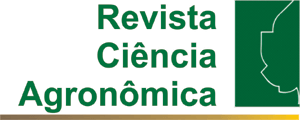Abstract
The study aimed to evaluate soil chemical changes and yield of two cultivars of Panicum maximum Jacq. (Tanzania and Mombaça) in response to irrigation with effluent from inland shrimp farming and compare the results with those obtained with conventional irrigation using river water. The experiment was carried out in a shrimp farm, in Russas-CE, Brazil. It was used a randomized block design, in a factorial 2 (grass cultivars) x 2 (types of irrigation water). The following yield variables were evaluated in four grass cuttings: height, dry matter yield and dry matter content. Data were analyzed by ANOVA and Tukey test. The following soil chemical properties were analyzed before and after treatment application: pH, electrical conductivity of saturated extract (CE), exchangeable sodium percentage (ESP), organic matter, P, K+, Ca2+, Mg2+ and Na+. Data were analyzed using t tests for paired observations, at 5% significance level. Irrigation with effluent from shrimp farming did not increased or reduced significantly dry matter yield of two cultivars of Panicum maximum as compared to irrigation with Jaguaribe river water. After 14 months of cultivation, levels of Na+, CE and ESP increased significantly (p < 0.05) in the soil irrigated with effluent, as compared to the soil irrigated with river water.
Key words
L. vannamei; Water reuse; Soil salinization; Shrimp farming; Panicum maximum
